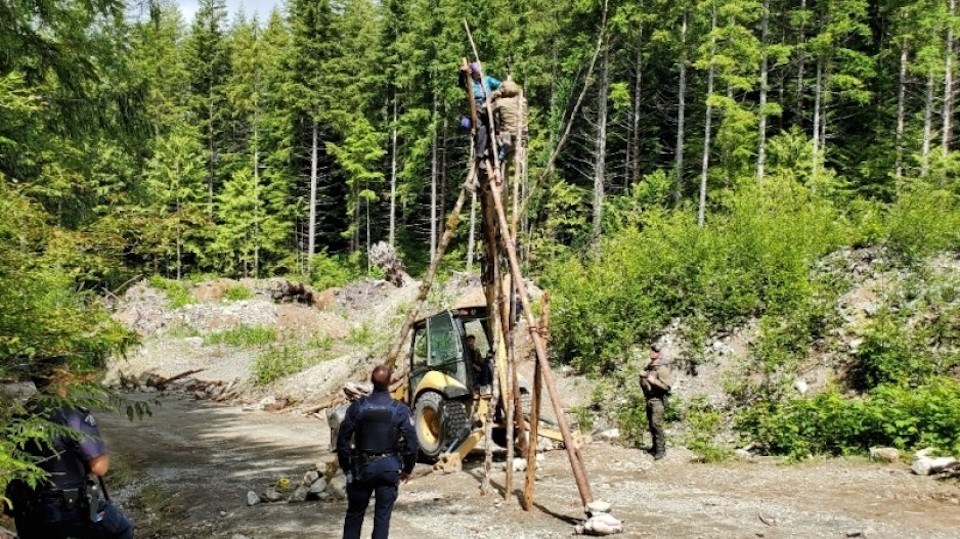The B.C. Court of Appeal has overruled a lower court judge who refused to grant an extension to an injunction against anti-logging protesters on Vancouver Island.
The injunction against members of the Raincoast Flying Squad and their supporters, who have used ever more “extreme” and illegal measures to try to blockade an area of Vancouver Island where Teal Jones has logging rights, has been extended to Sept. 26, 2022, as a result of today’s ruling.
Several members and associates of the group are named in the injunction: Robert Arbess (aka Reuben Garbanzo), Kathleen Code, Carole Toothill, William Jones, Keith Cherry, Rani Earnhart, Saul Arbess, Warren Kimmitt and Donna Clark.
“Today’s decision affirms the rule of law, confirming that the dangerously illegal actions by blockaders in Tree Farm License 46 not only harm Teal Jones but are also a threat to our democracy and rule of law,” Teal Jones said in a statement following today’s ruling.
Protests have been ongoing since August 2020, and have continued despite hundreds being arrested.
On April 1, 2021, a B.C. Supreme Court judge granted Teal Jones' application for an injunction.
While RCMP have made hundreds of arrests, it has not stopped the blockades. The Appeal Court noted that protesters are “sophisticated, and well-organized” and have raised $1 million to support their campaign against old-growth logging.
In September, 2021, a B.C. Supreme Court judge declined Teal Jones’ application to have the injunction extended for one year.
In doing so, he said the tactics used by protesters were illegal, and therefore police and prosecutors already had the legal authority to enforce the law against them.
But just because police and prosecutors can enforce the law, that's no guarantee they will. Indeed, if that were the case, Teal Jones would never have had to apply for an injunction in the first case.
The Appeal Court said the lower court judge “committed a palpable and overriding error of fact by finding that the criminal law would be used in this case to prevent ongoing harm to Teal Cedar.”
The Appeal Court notes that there are good reasons for injunctions. It points out that “because a private applicant cannot ensure that the police and prosecutors will initiate and pursue criminal law proceedings to provide the required protection, there will always be a gap, and it is for that reason that the remedy of an injunction exists.
“The availability of the criminal law is not a factor weighing against the granting or extension of a civil injunction to a private entity. The public interest in upholding the rule of law continues to be the dominant public interest in cases involving civil disobedience against a private entity.”
The court also notes that Teal Jones was not the only party harmed by the endless blockades. The Pacheedaht and the Ditidaht First Nations have repeatedly asked protesters to leave their territory, and could not rely on police and BC Prosecution Service to enforce their requests.
“These Nations have asked the protesters to leave their territory, and to respect their right to decide how best to manage their resources. Those requests have not been heeded,” the Appeal Court noted.
“This case is…about the principles that apply when a court is asked to enjoin significant and persistent unlawful conduct by those who choose to abandon the democratic process and impose their will on others by force. There is a clear demarcation between the type of conduct displayed in this case and the actions of lawful protesters who use peaceful means to persuade the government to change policy."
An area commonly known as Fairy Creek on Vancouver Island became a flashpoint for anti-logging protests organized by a group called the Raincoast Flying Squad. The court notes their tactics for trying to prevent loggers from accessing TFL-46 have become “more extreme over time.”
These tactics include digging trenches in roads and the use of “sleeping dragons” – i.e. protesters chaining themselves into devices encased in concrete, embedded in a metal box and fortified with metal hazards like barbed wire or spikes.
“There is no doubt that one or more of the respondents form part of a protesting group that is committed, sophisticated, and well-organized,” the ruling noted.
“Protesters have used social media to raise over $1 million to date. They make use of the Internet to recruit individuals for specific tasks such as camp support, obstacle construction, transportation, and occupation of obstacles. They have a command and control network, a communication system to coordinate their activities, a transportation network, and dedicated construction areas and supply camps.
“They use drones to surveil the police and have used helicopters to resupply their camps. The methods used by those obstructing the roads have become more extreme over time. The police have removed 350 protesters from 'sleeping dragons' and at least 100 from tripods set up in the middle of the roads.”
“While protest and debate are cornerstones of Canadian civil society, the blockaders have crossed the line,” Teal Jones said in its statement. “They have defied the repeated requests of local First Nations to leave.
“They have threatened tree spiking and scattered nails across roads. They have destroyed helicopter landing pads to put the lives of pilots and workers at risk. They have jumped out of the bush to startle fallers actively working chainsaws, putting their lives at risk. They have made numerous false claims about old growth protection and harvesting in the area.”




